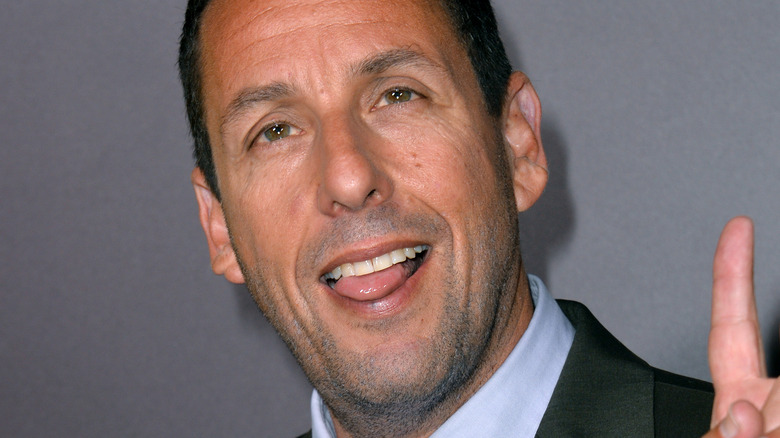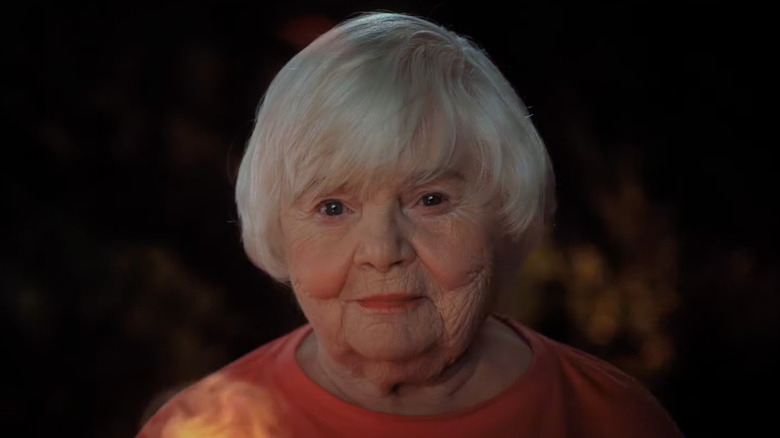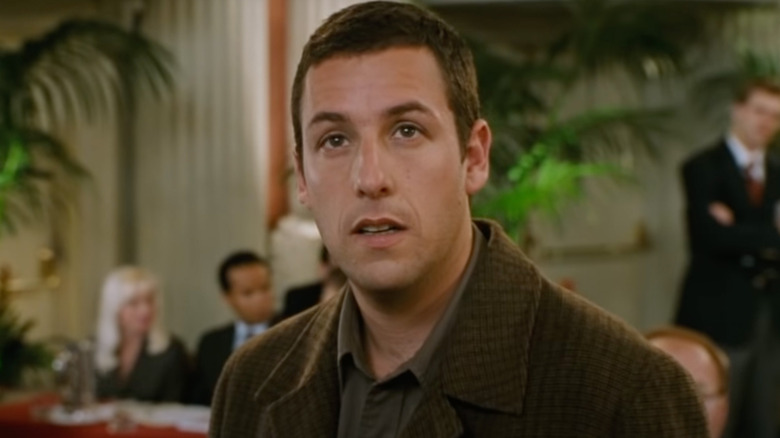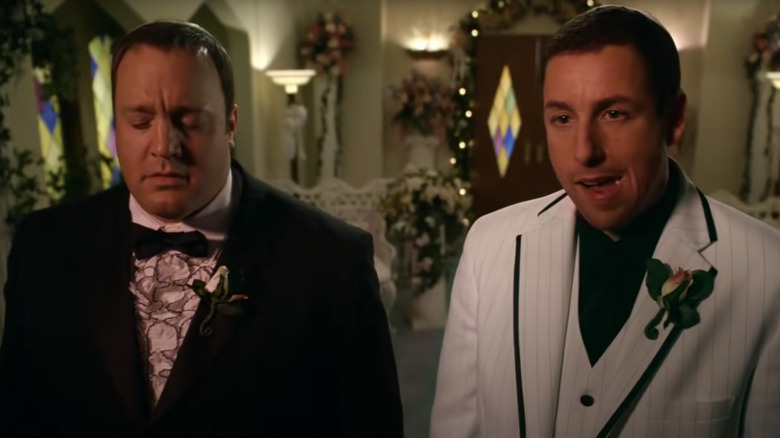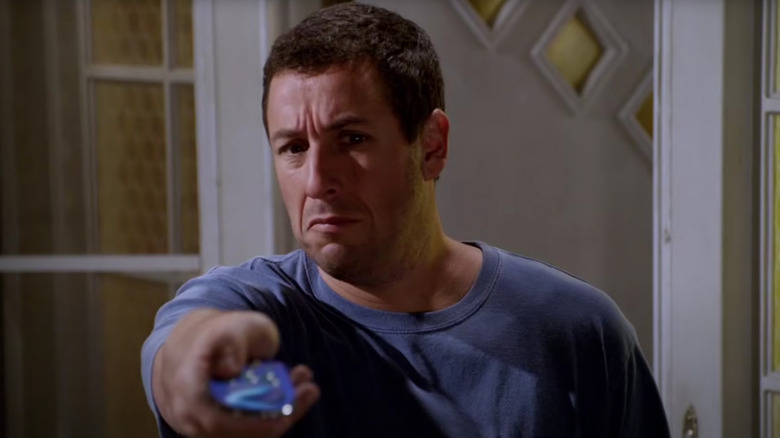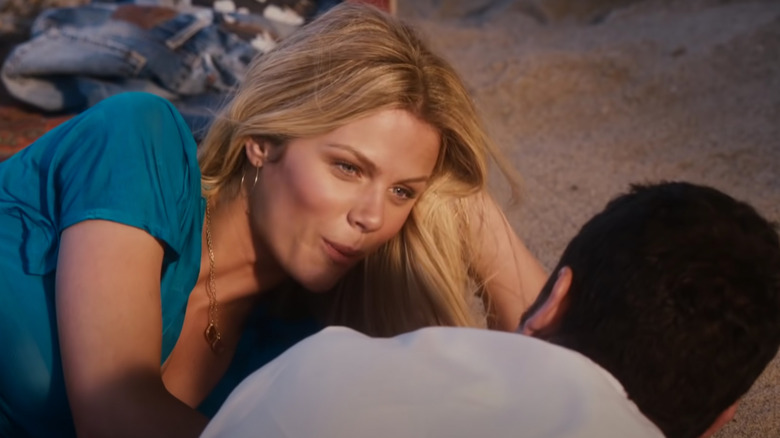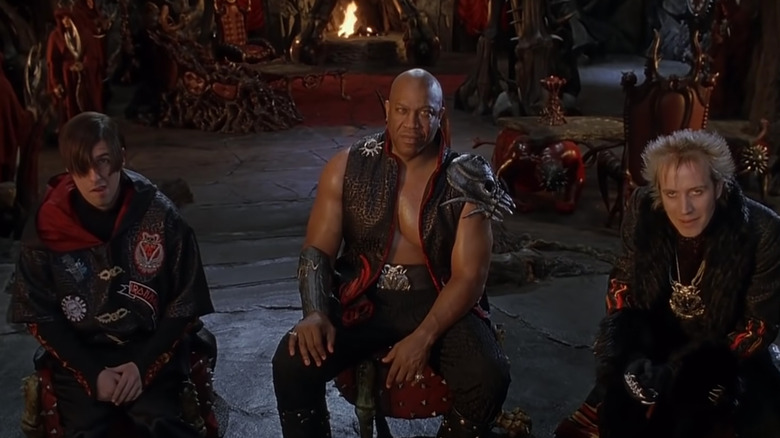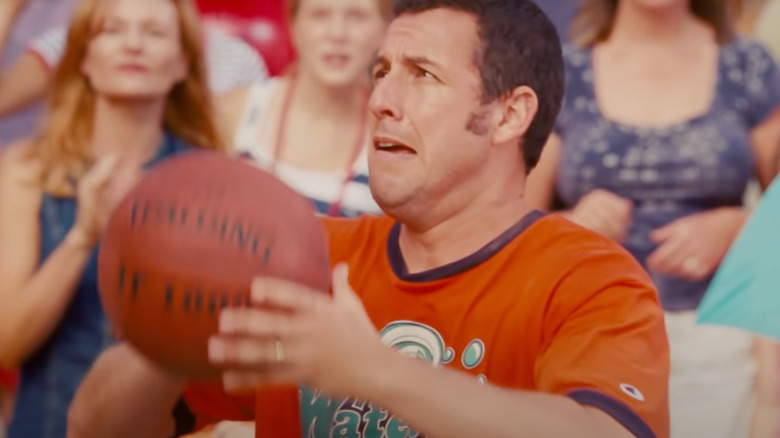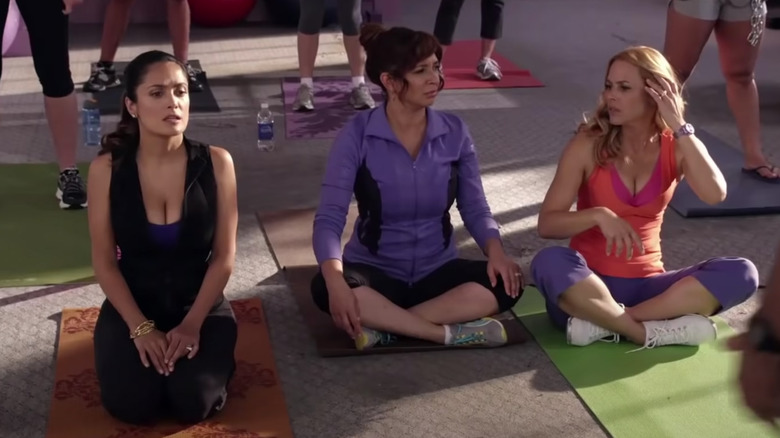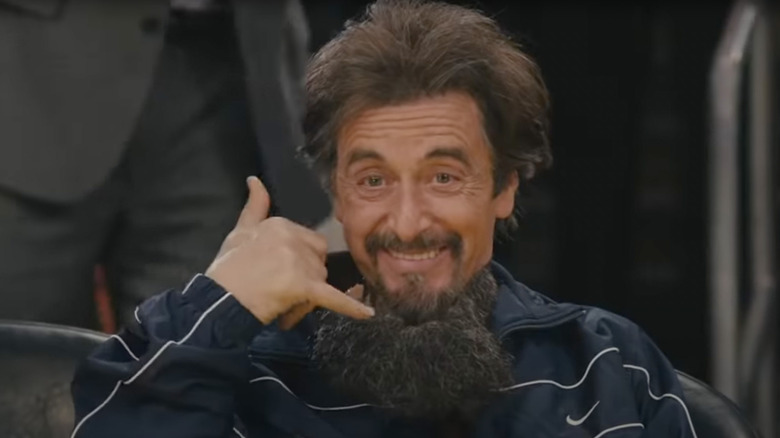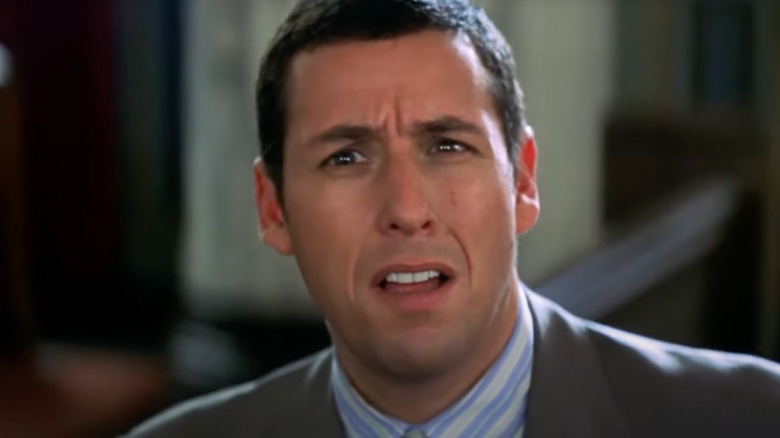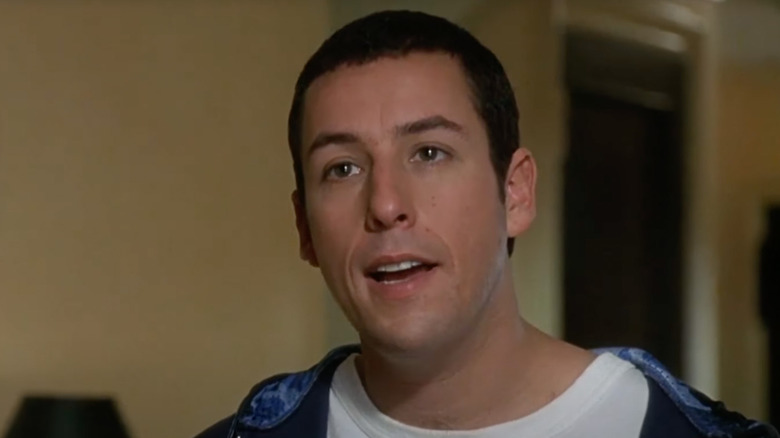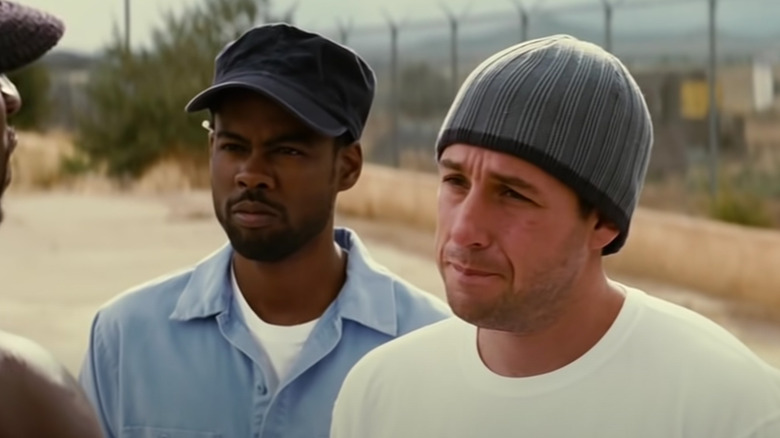The Most Terribly Acted Adam Sandler Movie Scenes Ranked
Who doesn't love Adam Sandler? The man has entertained and delighted audiences since the mid-90s with films such as "Billy Madison," "Happy Gilmore," "The Wedding Singer," and "Big Daddy." Currently, the actor spends much of his time producing films such as "Hubie Halloween" and the "Ridiculous 6" for Netflix while flexing his acting chops in low-budget, critically acclaimed dramas like "Uncut Gems." The man is undoubtedly versatile, even if he spends far too much time languishing in goofy comedies; though, considering his films have accrued over $3 billion at the worldwide box office, it makes sense for him to stick with what brings in the cash.
Still, while Sandler has attained astronomical success, he occasionally finds himself stuck in a dud that leans on his worst instincts as an actor. Even his best movies feature several poorly acted scenes that leave you wondering how someone of Sandler's caliber could allow such moments to leave the editing room unscathed. Here is a list of the most terribly acted Adam Sandler movie scenes ranked from best to worst.
The mom & killer reveal in Hubie Halloween
Most Adam Sandler films lean on goofy bathroom humor to entertain the masses, often at the expense of story and character. So, it's always strange when the comedian tries to shoe-horn some not-so-subtle message to give the silly antics a shade of relevance. Such attempts typically fall flat, as is the case with Netflix's "Hubie Halloween," which ends on an undeniably cheesy note replete with a "Scooby Doo"-like bad guy reveal, hammy acting, and a tacked-on bit of sentimentality.
"Hubie Halloween" centers around Sandler's Hubie, a coward with a big heart who spends his days fending off cruel pranks enacted by the local townsfolk of Salem, Massachusetts. On this particular October 31, however, someone (or something) is going around kidnapping the pranksters, leading our noble hero to pack his trusty thermos and investigate the creepy proceedings. As it turns out, Hubie's mother, Mrs. Dubois (June Squibb), is the mysterious villain; she was simply sick of everyone picking on her son and decided to exact vengeance on the bullies.
Thankfully, Hubie arrives before she can kill anyone. The bizarre scene quickly nosedives into cornball sentiment when the victims (including Maya Rudolph, Tim Meadows, and the late Ray Liotta) apologize to Hubie for their cruel jokes. This heartfelt moment would work if anyone involved gave a damn about what they were saying. But, alas, they don't, and so neither do viewers.
Mr. Deeds' ending
"Mr. Deeds" is a mostly entertaining affair with enough jokes to hold your attention for much of its 95-minute runtime. However, the fun quickly gives way to a cheese-infested finale that flounders because everyone involved looks positively bored.
The scene in question features Longfellow Deeds (Sandler) arriving at a shareholders' meeting to convince everyone not to sell his uncle's company to the villainous Chuck Cedar (Peter Gallagher). "You're just going to have to convince everyone to start hating money," Cedar says with an evil laugh. Deeds then goes into a speech where he more or less convinces the wicked rich people in the room to be better. Unfortunately, Sandler's acting is relatively flat in this bit, which requires a little more charisma to sell the idea entirely. On top of that, the handful of extras predictably fumbles their lines. To be fair, even the best actor would have difficulty wrapping their chops around dialogue like this: "I don't know who licked the red off your lollipop today, but you are preaching to the wrong choir."
To make matters worse, Winona Ryder suddenly appears with information that proves Emilio Lopez (John Turturro) is the legitimate heir to Deeds' uncle's fortune. Ryder's wide-eyed delivery is embarrassing, as is Turturro's goofy celebratory dance and Gallagher's dumbfounded expression. Sandler mostly watches the debacle happen and then mumbles his way through a tacked-on ending that sees everyone live happily ever after. Yuck.
I Now Pronounce You Chuck and Larry speech
In "I Now Pronounce You Chuck and Larry," Adam Sandler and Kevin James star as a pair of straight firemen who pretend to be gay for insurance purposes. The film, directed by Dennis Dugan, tries to come across as satirical, poking fun at homophobia and the like, but it all ends up as a crass exercise in bad comedy.
Also, as if to fend off any unwanted assumptions of his sexuality, Sandler's character is really straight. Like, parties with a group of strippers on a nightly basis straight. We see this scenario play out early in the film when James pays his somehow rich firefighter buddy a late-night visit and finds him adorned in a bathrobe entertaining a group of scantily clad women like some sort of discount Hugh Hefner. Said women head into the kitchen looking for Gatorade — because egregious product placement is also a Sandler trope — and our boy tells them to search the bottom shelf of the refrigerator so that they'll bend over and give him a better view of their backside.
The joke here is that a man of Sandler's straightness must pretend to be gay to help his buddy out — get it? The problem is, no one involved actually sells the joke. Sandler doesn't come across as a womanizer, James doesn't react believably to the women in front of him, and the girls have all the range of your average porn star.
Michael confronts his wife in Click
Adam Sandler apparently wants to be viewed as a modern Jimmy Stewart-esque hero, but can't seem to get out of his own way. "Click" sees Sandler unleash his dramatic chops as a man who attains a magical remote control that allows him to skip the tedious portions of his life, only to miss out on essential events revolving around his family. Unfortunately, his life problems feature the likes of David Hasselhoff, Kate Beckinsale, and Rob Schneider's Prince Habeeboo, which makes the forced sentimentality harder to stomach.
Case in point: near the end of the film, Sandler's character, Michael, collapses in the rain in pursuit of his former wife (Beckinsale) and her new beau, played by Sean Astin. The moment is meant to be a big, dramatic payoff, but ultimately falls flat due to dopey dialogue ("Will you still love me in the morning?" "Forever and ever, babe"), hammy acting, and poorly timed humor (Sandler's character flips off Astin before giving him the thumbs up). It doesn't help that our actors must recite their dialogue behind unconvincing old-age makeup or that Christopher Walken appears and manages to outdo everyone with just a few short lines.
Sandler has shown off his dramatic chops in films such as "Uncut Gems" and "Punch Drunk Love." As such, we're willing to forgive this rather egregious miscalculation.
Palmer and Danny on the beach in Just Go with It
Once he aged out of playing lovable, adolescent losers, Adam Sandler attempted to restructure his onscreen image into something more mature, resulting in a series of films where he portrayed rich, successful fathers with a knack for attracting young, beautiful women. In "Just Go with It," Sandler, a wealthy plastic surgeon, walks into a party, flashes a smile, and leaves with Sports Illustrated Swimsuit model Brooklyn Decker on his arm. The pair even enjoy a night of sex alongside a majestic beach, where she reveals everything about her person — she teaches sixth-grade math, people!
Considering this romantic entanglement is an enormous plot point throughout the film, the actors could have done a better job selling the setup. Instead, after some half-baked dialogue, Decker and Sandler make out and start discussing long-term plans. "This feels like it could be the real thing," she says with all the conviction of a supermodel being forced to play Adam Sandler's love interest. Here we have a case of a film needing to tell us what characters are thinking because the actors involved aren't good enough to convey the proper emotions. Thankfully, Sandler spends most of the picture bantering with the much more charismatic Jennifer Aniston.
Nicky fights his brother in Little Nicky
"Little Nicky" was dead on arrival as a sort of heat check for Adam Sandler following the massive successes of "Billy Madison," "Happy Gilmore," "The Wedding Singer," "The Waterboy," and "Big Daddy." The comedian goes for broke as the dimwitted but big-hearted son of Satan, whose raspy growl and wicked combover make him an oddball amongst all but Patricia Arquette — she wears glasses, so she's just like him!
The plot of "Little Nicky" centers around the titular hero's attempts to stop his brothers from undermining Satan (Harvey Keitel) and creating a literal Hell on Earth. Nicky eventually squares off with Adrian (Rhys Ifans) in Central Park via a magical brawl featuring rainbows, bats, and Ozzy Osbourne. Oh, and Rob Schneider shows up to reprise his funny "You can do it!" bit from "The Waterboy," in case you needed that.
The finale has moments, but everyone involved goes ham trying to sell the comedy. Ifans works best as a rage-filled evil-doer, but Sandler, Arquette, and the dozens of extras on display (including Sandler's pal Allen Covert) can't seem to muster the reactions needed for the whole thing to stick. So while much of "Little Nicky" sucks, this particular bit is the proverbial nail in the coffin.
The basketball game in Grown Ups
"Grown Ups" is one of the lazier entries in Adam Sandler's career. Sure, the film has its moments, but the 2010 comedy primarily serves as an excuse for Sandler to hang out with his buddies Kevin James, David Spade, Chris Rock, and Rob Schneider. There's a semblance of a story here, but director Dennis Dugan is more interested in juvenile bathroom humor and excessive pratfalls than the characters jostling about on screen. If anything, "Grown Ups" proves how powerful Sandler has become in the realm of Hollywood. Who else could convince a studio to fork over $80 million for what amounts to a vacation for this ragtag group of actors?
Anyways, one could pick any number of scenes from "Grown Ups" as an example of bad acting, but we're going with the big basketball game that serves as the finale. Had the remaining film not been so carelessly slapped together, this sequence, in which Sandler and company battle a group of former rivals in a pickup game amidst hundreds of bored spectators, might have struck an emotional chord. Instead, the entire bit feels like a tacked-on piece of TV sitcom sentiment ordered by studio heads to give the comedy some purpose.
Also, many of the actors suck at basketball, except for Sandler, which might be the point. He's the ultra-successful megastar carrying a bunch of C-level comedians on his back. Well played, Sandler.
Vanilla Ice Cameo in That's My Boy
Adam Sandler relishes resurrecting (or attempting to resurrect) the careers of former stars. Henry Winkler, Sean Astin, and David Hasselhoff are examples of actors who enjoyed a semi-career resurgence playing variations on themselves in Sandler's comedies. Even more stunning was his endeavors to raise the once beloved singer Vanilla Ice from the grave not once but twice.
Robert Matthew Van Winkle appears as himself in the forgettable comedy "That's My Boy" and completely fumbles his dialogue. Someone offscreen was obviously feeding the songwriter his lines one sentence at a time, forcing editor Tom Costain to cut the holy hell out of the various scenes to make them work. Kudos to Sandler for having the cojones to try something so brave in a film that frustratingly never strays too far from its comfort zone. But, in the end, the moment, which culminates in another bit of slapstick, doesn't work.
Vanilla Ice also appears in the Netflix comedy "The Ridiculous Six" as, wait for it ... Mark Twain. Surprisingly, he carries himself better here than in "That's My Boy," mainly because he spends much of his screen time dancing and dropping 90's era slang alongside David Spade's equally goofy General Armstrong Custer. We won't call either performance art but will admit it takes a particular set of skills to truly stand out in an Adam Sandler film, for better or worse.
Yoga scene in Grown Ups 2
Even diehard fans of Adam Sandler's lazy antics will likely scratch their heads at the yoga scene in "Grown Ups 2," which features a tired-looking Jon Lovitz posing as a yoga instructor. His character is really a janitor, you see? But the actual yoga instructor was late, so Lovitz decided to step in and deliver his own unique series of instructions.
Standing before our three leading ladies — Salma Hayek, Maya Rudolph, and Maria Bello, who all deserve better — and a group of eerily quiet extras, Lovitz instructs the class of women to shake their chests, jump up and down and bend over for his viewing pleasure. Everyone does as they're told without question and are shocked — shocked! — when the real instructor shows up. Later, in the same scene, our gals are overcome by the real instructor's "gorgeous" looks to the point they have difficulty speaking. Naturally, he turns out to be gay, and the women demonstrate their disappointment by booing in a completely believable fashion.
Everything about this bit, from the bland line delivery to the over-sexualized gags, reeks of desperation. Those involved — including acclaimed actors Hayek and Bello — look like they would rather be in another film that doesn't force them to bend over and smack their rear ends. Seriously, the entire scene stands out as the worst in a movie that kicks off with a deer urinating in Sandler's mouth. Let that sink in.
Al Pacino's meltdown in Jack and Jill
"Jack and Jill" is a wild miscalculation on Adam Sandler's part. He thought the world wanted more Sandler and obliged by appearing as twins in this painfully unfunny misfire. Still, it takes an exceptional talent to make Academy Award-winner Al Pacino look bad, but Sandler accomplishes the feat by positing the veteran actor in a series of dumb scenes that cater to his worst impulses, i.e., lots of yelling.
Pacino, portraying himself, even falls in love with Jill, the female Sandler character. He tries to woo her in one bit by demonstrating the art of stickball. When Jill accidentally breaks his Oscar for "Scent of a Woman," she remarks: "I'm sure you have another." To which he replies, "You would think so." Clever.
Unfortunately, Pacino sleepwalks through his performance and displays little chemistry with either Jack or Jill. Indeed, you'll spend most of the movie wondering how Sandler lured Pacino into this hot mess. Here's a tip, Sandler: if you somehow land Pacino in a movie, give him more to do than make lewd gestures with a stick.
Dave loses his job in Anger Management
A large part of Adam Sandler's schtick involves him losing his temper randomly, often with hilarious results. The problem with "Anger Management" is that it leans too hard on this gag and makes Sandler's world-weary Dave Buznik less likable. Yet, we're meant to empathize with this person when he suddenly flies off the rails after losing out on a job promotion — a bit that turns out to be part of Dr. Buddy Rydell's (Jack Nicholson) anger management therapy.
It's best not to think about it too hard.
Surprisingly, Sandler plays the entire scene in a low-key manner, mumbling his way through the dialogue without much zeal. Dave is supposed to be a character burning with internal rage, but the actor's dull execution lacks the subtle nuances needed to sell the moment. For a better example of an in-office meltdown, check out Tom Hanks in "Joe Versus the Volcano," which is precisely the sort of comedy-pathos "Anger Management" clearly seeks to achieve.
Break up scene in Big Daddy
"Big Daddy" has all the usual Sandler-isms, but manages to spin a sweet, if not cloying, tale revolving around the challenges presented by fatherhood. Sandler plays Sonny, a selfish man coasting through life whose world is turned upside down when a young boy appears at his front door. Predictably, the pair bond and Sonny slowly becomes a mature adult figure.
Naturally, part of his progression entails ditching his previous girlfriend, a no-good woman named Vanessa (Kristy Swanson), who ... wants stability? Somehow, the movie views her yearning for growth and dependability as bad. She even ends up working at Hooters as punishment for her ambitions.
The big breakup scene occurs midway through the movie when Sandler's character, Sonny, arrives with his newly adopted child in tow to demonstrate his newfound responsibility. The problem is Vanessa has already moved on with a much older fellow offering better security. "He has a five-year plan," she explains. "What is it? Don't die?" Sonny shoots back. Naturally, since this is a Sandler production, no one has a retort and can only stand around looking dumb while he fires off endless one-liners. At one point, he shouts, "Hey, old man river, zip it, or I'll break your hip." Hilarious.
Sandler mostly plays Sandler here — never rising above or below the material — but the acting from everyone involved (plus the cheesy dialogue) makes this moment in "Big Daddy" entirely forgettable.
Opening prison scene in The Longest Yard
Adam Sandler is many things, but a tough guy ain't one of 'em. Unfortunately, in the 2005 remake of "The Longest Yard," the funnyman must step into shoes once filled by Burt Reynolds. We're meant to believe he's a bad boy football star (dating Courteney Cox, no less) with a heart of gold capable of holding his own in a violent Texas prison. His introduction to the facility, rendered in slow-mo and set against rap music, needed to sell Sandler's grit and resolve. Instead, we see a poorly miscast actor attempting to play a role better suited for someone like Tom Hardy or Mark Wahlberg.
Indeed, during the prison intro sequence, Sandler tries to convey a character who can withstand the brutal physical assaults dished out by Captain Brian Knauer (William Fichtner) and match the intellect of Warden Rudolph Hazen (James Cromwell). He's an intelligent tough guy. Get it? Sandler's performance never finds the right balance between rugged manliness and wit, leaving audiences mourning for the good ole days of hapless football star Bobby Boucher, Jr. Now, there's a role Sandler played to perfection.
